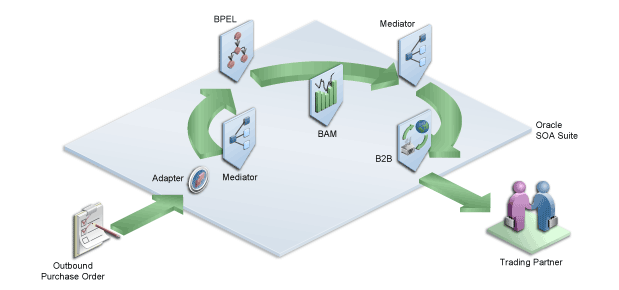
Oracle B2B
Oracle B2B is an eCommerce gateway that enables the secure and reliable exchange of messages between an enterprise and its trading partners. It is a binding component of the Oracle SOA Suite and this platform enables the implementation of complete end-to-end eCommerce business processes.
What Is eCommerce?
Electronic commerce, eCommerce, is the buying and selling of products or services electronically and can take many forms, for example, machine-to-application, customer-to-application, application-to-application and business-to-business (B2B). In any form, eCommerce, is an integral component of any enterprise integration strategy and the focus must be the business process. You must address process orchestration, error mitigation, data (translation, transformation, and outing), security, compliance, visibility, and management.
What Does Oracle B2B Provide?
What Is eCommerce?
Electronic commerce, eCommerce, is the buying and selling of products or services electronically and can take many forms, for example, machine-to-application, customer-to-application, application-to-application and business-to-business (B2B). In any form, eCommerce, is an integral component of any enterprise integration strategy and the focus must be the business process. You must address process orchestration, error mitigation, data (translation, transformation, and outing), security, compliance, visibility, and management.
What Does Oracle B2B Provide?
Oracle B2B addresses the documents, packaging, transports, messaging services, Trading Partner profiles, and agreements with the following features:
- Document Management: Provides multiple document standards, such as definitions, validation, translation, identification, correlation, batching, routing, code lists, and envelope generation.
- Trading Partner Management: Provides capabilities to manage trading partner profiles and agreements.
- Profiles: Provides trading partners details, such as identifications, contacts, users, delivery channels, supported documents, and security.
- Agreements: Enables agreement between trading partners for a specific interaction.
- System Management: Provides features to monitor and manage the environment.
The graphic demonstrates a typical eCommerce use case:
- The application initiates the purchase order.
- A mediator service component receives the purchase order. It validates, performs code conversion, transforms the purchase order to a canonical, and routes the document. (Canonical refers to a canonical data model that is used to transition between different document standards.)
- A BPEL process service component receives the purchase order, orchestrates any required business process, and can invoke a human task, business rule, and error handling as required.
- A mediator service component receives the purchase order, validates, performs code conversion, transforms the canonical to the target purchase order, and routes the document.
- Oracle B2B
receives the purchase order, identifies the partner, identifies the agreement, validates the purchase order, translates the purchase order to EDI, generates the EDI envelope, generates acknowledgments, and manages the secure exchange of the purchase order with the external trading partner.